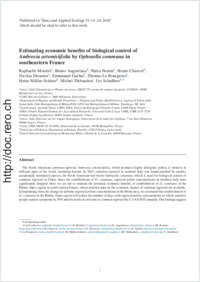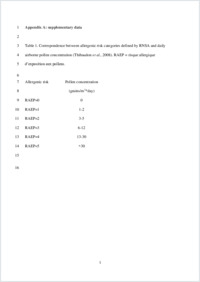Estimating economic benefits of biological control of Ambrosia artemisiifolia by Ophraella communa in southeastern France
- Mouttet, Raphaelle Anses, Unité Entomologie et Plantes invasives, CBGP, Montferrier-sur-Lez, France
- Augustinus, Benno Andreas CABI, Delémont, Switzerland
- Bonini, Maira Agenzia di Tutela della Salute della Città Metropolitana di Milano/LHA ATS Città Metropolitana di Milano, Parabiago, Italy
- Chauvel, Bruno Agroécologie, AgroSup Dijon, Université Bourgogne Franche-Comté, Dijon, France
- Desneux, Nicolas French National Institute for Agricultural Research, Université Côte d’Azur, Sophia-Antipolis, France
- Gachet, Emmanuel Anses, Unité Expertise sur les risques biologiques, Angers, France
- Le Bourgeois, Thomas Cirad, Montpellier, France
- Müller-Schärer, Heinz University of Fribourg, Department of Biology, Switzerland
- Thibaudon, Michel French Network of Aerobiological Monitoring RNSA, Brussieu, France
- Schaffner, Urs CABI, Delémont, Switzerland
-
01.12.2018
Published in:
- Basic and Applied Ecology. - 2018, vol. 33, p. 14–24
English
The North American common ragweed, Ambrosia artemisiifolia, which produces highly allergenic pollen, is invasive in different parts of the world, including Europe. In 2013, common ragweed in northern Italy was found attacked by another accidentally introduced species, the North American leaf beetle Ophraella communa, which is used for biological control of common ragweed in China. Since the establishment of O. communa, ragweed pollen concentrations in northern Italy have significantly dropped. Here we set out to estimate the potential economic benefits of establishment of O. communa in the Rhône-Alpes region in south-eastern France, where detailed data on the economic impact of common ragweed are available. Extrapolating from the change in airborne ragweed pollen concentrations in the Milan area, we estimated that establishment of O. communa in the Rhône-Alpes region will reduce the number of days with ragweed pollen concentrations at which sensitive people express symptoms by 50% and the medical costs due to common ragweed by 5.2–6.8 M € annually. Our findings suggest that investments of public funds are justified to conduct a complete assessment of the potential risks and benefits associated with the accidental establishment of O. communa in Europe.
- Faculty
- Faculté des sciences et de médecine
- Department
- Département de Biologie
- Language
-
- English
- Classification
- Biological sciences
- License
- License undefined
- Identifiers
-
- RERO DOC 323808
- DOI 10.1016/j.baae.2018.08.002
- Persistent URL
- https://folia.unifr.ch/unifr/documents/307232
Other files
Statistics
Document views: 104
File downloads:
- mue_eeb.pdf: 300
- mue_eeb_sm.pdf: 88

